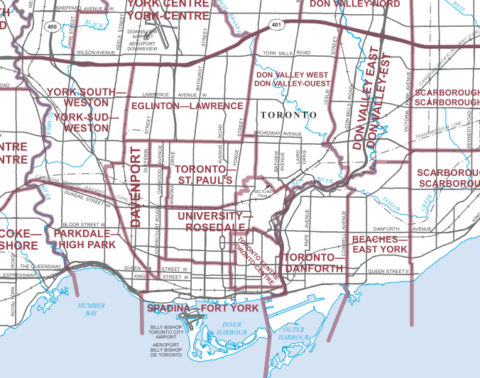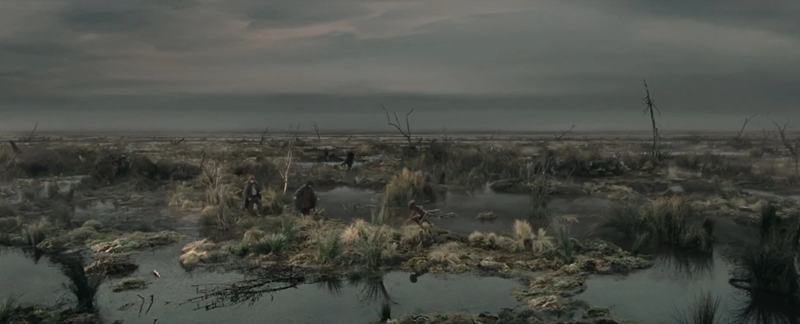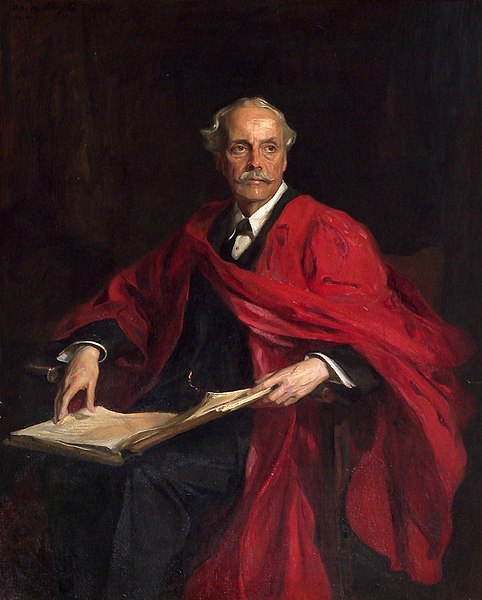Continuing on from yesterday’s initial post on the outcome of the by-election in Toronto-St. Paul’s — which until 4:30 on Tuesday morning might have been the dictionary definition of a “safe Liberal seat” — as comments from vengeful anti-Liberal and whistling-past-the-graveyard pro-Liberal commentators appear. Here’s noted anti-Liberal David Warren from Parkdale which more often elects NDP candidates over Liberal ones:

The electoral boundaries of Toronto-St. Paul’s and nearby downtown Toronto ridings.
Detail of an Elections Canada map of Toronto.
Toronto-Saint Paul’s is defined, among the political experts, as a “safe Liberal seat”. For one thing, it is in the middle of Toronto, where the Conservatives have no members. (The NDP occasionally wins ridings like Parkdale.) According to a pollster, who is (in my opinion) a Liberal party hack, if the Liberals were to lose Saint Paul’s, it would mean that there were no safe seats left for them in Canada. None is the same as zero, incidentally.
Late last night, we learned that the Liberals had lost Saint Paul’s.
It was just a by-election, however. Toronto’s electorate enjoys the kind of deep somnolence that is not permanently correctible. Its people are typical of urban voters everywhere: they are easily convinced by “progressive” fantasists, and environ-mental snake-oil salesmen. Hence, liberal-lefties control all the big-city municipal governments, and provide marionettes to all the national puppet theatres. Those who voted against them will return to snoring mode after just a moment’s consciousness.
At The Line, a rare Jen Gerson column outside the paywall:
The goose. She cooked.
The toast. It burnt.
The frog. It boiled.
[…]
Anyway, my lack of political dedication was well rewarded because I’m now refreshed and well positioned to opine on the great momentous meaning of Don Stewart’s election to the House of Commons to represent the fine people of this section of midtown Toronto. Normally I wouldn’t get too fussed over a by-election anywhere, but in this case a fuss is impossible to avoid.
Two reasons; the first is that I have — in my lovingly Albertan way — referred to this riding as the Dead Marshes. For those who are not Lord of The Rings fans, this section of land is technically considered a reeking wetland that stretches to the south-east of Emyn Muil; a terrible stretch of land that sits just outside Mordor, and final home to the preserved corpses of many Conservative candidates, staffers, volunteers, and hopes and dreams. Every once in a while, their enchanting methane soul lights flare forth, entrancing the unwary or the naïve into the swamp.
Which is a very nice way of saying that St. Paul’s is a bastion of the ruling Laurentian Consensus, a Liberal fortress long held by Carolyn Bennett, and untainted by the stain of Conservative voting intentions since 1993. And yet, Mr. Stewart ventured forth undaunted, and found his path into Mordor (a metaphorical stand in for either Toronto, or Parliament. Interpret as you see fit).
The second reason that this election cannot be ignored is that both the Liberals and the Conservatives have invested it with so much symbolic weight, that the outcome will herald political changes of one kind or another. A 43 per cent turnout rate in a by-election is healthy — even high. Nobody can chalk that outcome up to numerical wonkery. Conservatives were motivated, and progressives were not. The signal is clear.
It is now impossible for an increasingly unglued Liberal caucus to overlook that they are losing. They are losing very badly. A sustained 20-point Conservative lead has been made manifest. If St. Paul’s can crash, they are all at risk. And they can no longer wave that fact away by sniping at pollsters, or blaming misinformation. A plurality of Canadians think they suck at governmenting. This must now be addressed.
Tristin Hopper on the social media site formerly known as Twitter:







